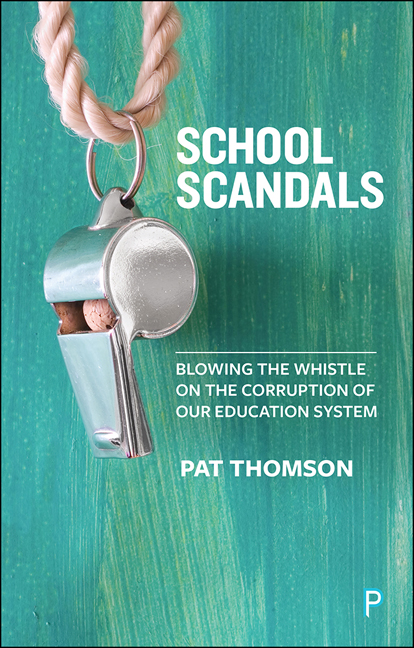Book contents
- Frontmatter
- Dedication
- Contents
- List of Tables and Boxes
- Glossary
- Acknowledgements
- Preface
- 1 A Book about Corruption in Schools
- 2 A Scandalous Schooling Muddle
- 3 Reforming Public Infrastructure
- 4 Costly Measures
- 5 Market Mentalities and Malpractices
- 6 The Effects of Effectiveness
- 7 Secrecy, lies and Gaming
- 8 Rebuilding Organisational Infrastructure
- 9 A Public Good Agenda for Change
- Notes
- Bibliography
- Index
2 - A Scandalous Schooling Muddle
Published online by Cambridge University Press: 25 February 2021
- Frontmatter
- Dedication
- Contents
- List of Tables and Boxes
- Glossary
- Acknowledgements
- Preface
- 1 A Book about Corruption in Schools
- 2 A Scandalous Schooling Muddle
- 3 Reforming Public Infrastructure
- 4 Costly Measures
- 5 Market Mentalities and Malpractices
- 6 The Effects of Effectiveness
- 7 Secrecy, lies and Gaming
- 8 Rebuilding Organisational Infrastructure
- 9 A Public Good Agenda for Change
- Notes
- Bibliography
- Index
Summary
Skills Minister admits students remain without courses more than a year after training providers collapse
Times Educational Supplement, February 2018Academy plans pose ‘significant risk’ to government finances
The Guardian, 20 April 2016Prepare for lower-than-predicted budgets, councils warn
Times Educational Supplement, 19 October 2017Thousands of pupils set to miss out on first-choice primary school
The Guardian, 16 April 2019Headteachers: school planning remains fragmented and unclear
BBC News, 15 January 2016This chapter examines changes in the organisation of state schooling. I begin by examining key ideas germane to the formation of a national education system using the writings of Sidney Webb. The narrative then shifts to the post-welfare state and structural changes integral to economist calculative logics. The chapter argues that combinations of New Public Management (NPM), calculation and competition have led to an academised school system that, as headteachers have recently reported to media, is once again a muddle, ‘fragmented and unclear’. I do not offer a comprehensive chronology, but select events most relevant to concerns about corruption and corrupted practices. A timeline of these key events can be seen in Box 2.1 on pages 24–25.
Sidney Webb and the education muddle
Sidney Webb's work, together with that of his life partner Beatrice, laid the foundations for the 20th-century welfare state. It is worth spending a little time with Webb's educational thinking, as it establishes themes that underpinned the organisation of schooling in the 20th century.
At the end of the 19th century Webb saw the schooling problem as one of inequity and inefficiency combined. His Fabian Society pamphlet in 1901, The Education Muddle, begins with Webb nailing his efficiency concerns clearly to the mast. He wrote: ‘Our educational machinery in England has got into a notable mess. Some places have two or three public authorities spending rates and taxes on different sorts of schools, while others have none at all.’
Webb saw the fundamental and ‘fixable’ education problem as oversupply of schools, duplication of effort and no supply at all. The resulting waste and gaps were a grave concern because, if different children were offered very different types of schooling, they would have very different life chances.
- Type
- Chapter
- Information
- School ScandalsBlowing the Whistle on the Corruption of Our Education System, pp. 19 - 42Publisher: Bristol University PressPrint publication year: 2020



